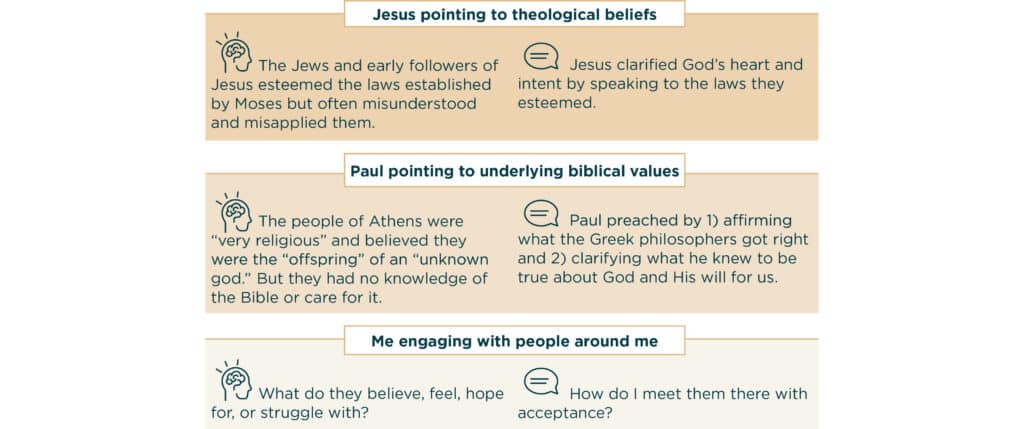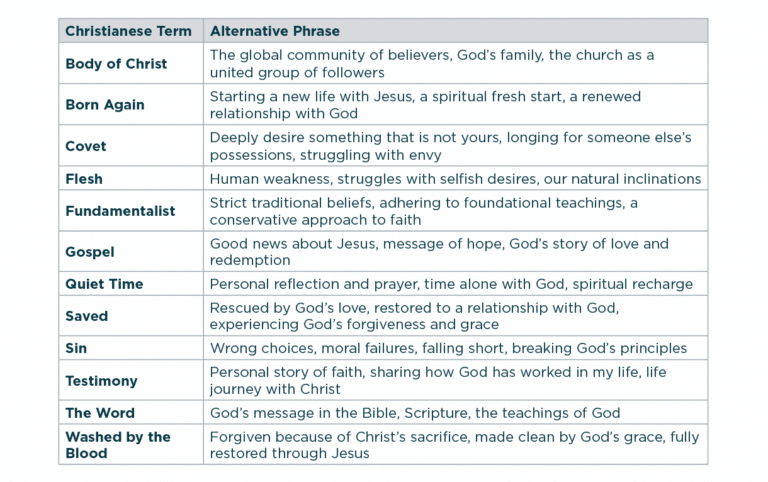Five Tips for Sharing Your Faith at Work
A Christian Leader’s Guide to Spiritual Conversations in the Workplace
The workplace is more than just a space for productivity—it is a mission field for Christian leaders. As a follower of Christ, you are called to share the gospel with all creation—and that includes your workplace. While 97% of Christians agree that being a witness for Jesus is vital, only 29% of unchurched Americans say they have ever had the gospel shared with them.
In this article, you will learn practical strategies for sharing your faith at work, provide real-life examples of workplace evangelism, and offer encouragement for approaching these conversations with confidence, sensitivity, and compassion.
Why the Workplace Is a Strategic Mission Field
Traditional church attendance in the United States has declined significantly in recent years. Gallup reports that two decades ago, 42% of US adults attended religious services weekly or nearly weekly. A decade ago, this dropped to 38%. Today, it currently stands at 30%. Despite this trend, the workplace remains a central part of daily life, offering Christian business leaders like you a strategic opportunity to live out their faith.

You have a unique opportunity to make a spiritual impact on those within your sphere of influence, including your colleagues, customers, vendors, and community. Some of your coworkers may have never set foot in a church, but they can encounter the power of the gospel in your workplace when you share and exemplify your faith.
Understanding Worldviews: Building Bridges for Faith Conversations
Effectively sharing your faith at work begins with understanding the diverse worldviews of those around you. Research into contemporary religious attitudes provides valuable insights to guide your conversations. Consider the following key points:
- Generational Perspectives on Faith: Millennials and Generation Z often value the personal relevance of faith more than intellectual arguments for God or historical evidence. When engaging with these generations, focus on how faith connects to their lives and experiences.
- The Rise of “The Nones”: A growing number of people identify as having no religious affiliation. The late Dr. Timothy Keller referred to these individuals as “the nones.” They may acknowledge a higher power but do not adhere to any specific religious tradition. They often describe themselves as “spiritual but not religious” or having “no religious preference.” Many of these individuals may be unfamiliar with foundational Christian concepts, including the Bible, Jesus, and the gospel story. Therefore, it is wise to avoid assuming they have prior knowledge of these topics.
- Sensitivity to Individual Comfort Levels: Each coworker will have a unique level of comfort with spiritual conversations. Recognizing and respecting these differences is vital to fostering meaningful dialogue.
- The Importance of Timing and Approach: Timing and delivery are just as important as the message itself. Look for natural opportunities to share your faith and consider the best moment to engage in a conversation. As the adage reminds us, it is not only about what you say but also how and when you say it.
Five Strategies for Sharing Your Faith at Work
The workplace naturally fosters relationships between believers and non-believers, making it a unique environment for spiritual conversations. According to Christian ethicist and speaker Will Tant, effective evangelism is not just about delivering speeches but also building relationships and engaging in meaningful dialogue. Drawing on best practices from leading evangelists, Will suggests five key strategies for sharing your faith at work:
Clarify the Entry Point
First, it is essential to clarify the entry point into a conversation about faith. Start by listening carefully to your coworkers’ perspectives with genuine curiosity and an open mind. Seek to understand their worldview and identify what might be preventing them from considering Christianity. This approach helps build trust and demonstrates a sincere interest in their thoughts and concerns. Once you have gained insight into their perspective, you can respond with thoughtful, rational answers to their questions, creating opportunities for deeper conversations.

Find Common Ground
When Jesus and Paul shared their faith, they adapted their messages to connect with their audiences. For religious individuals, they referenced the authority of Scripture, while for nonreligious individuals, they emphasized shared values and common moral principles.

To communicate your faith effectively, start by understanding the other person’s worldview. Once you do, identifying common ground becomes one of the most powerful ways to engage in meaningful conversation. Appealing to shared moral values that resonate with every human heart creates a bridge for deeper dialogue.
For instance, many nonreligious Westerners view human equality and dignity as self-evident truths. However, they may not realize that these values:
- Originate from a Christian worldview that upholds the sanctity of life
- Are fully supported only within Christian morality—a point recognized by both Christians and non-Christians
This insight presents an opportunity for Christians to share the theological foundation of human dignity, potentially opening the door for others to embrace Christ.
Be Authentic and Vulnerable
Being authentic and vulnerable is another powerful way to connect with others. Sharing your personal faith journey—your experiences, struggles, and growth—can make your message relatable and genuine. While others may not share your views on salvation or Scripture, they are likely to appreciate your honesty and sincerity. This approach is particularly meaningful to younger colleagues, who often value authenticity and vulnerability. By sharing key moments from your journey, you can inspire openness and invite others to share their stories as well.
Speak in Common Language
Just as professionals avoid jargon in business settings, Christians ought to be mindful of avoiding religious terms that might confuse or alienate those unfamiliar with them. Using clear, relatable language helps ensure your message is understood and well-received. Below are examples of “Christianese” terms, along with alternative phrases you can use to communicate more effectively with those who may not be familiar with such terminology:

Disarm the Conversation
Finally, focus on disarming the conversation. Evangelism in the workplace should prioritize building relationships rather than winning arguments. Approach each conversation with sensitivity to the individual and the situation. Be prepared to listen attentively, speak gently, or offer respectful disagreement when appropriate. Sharing the truth in love and with compassion creates a foundation for meaningful spiritual discussions. When people feel respected and understood, they are more likely to consider your perspective.
Real-Life Examples of Workplace Evangelism
Dean Harrington and Rachel Nguyen are business leaders in New England, a region they describe as spiritually “dark” due to the large number of people who do not know Jesus. Despite offering different services and serving distinct customer bases, both Dean and Rachel felt a strong conviction to bring intentional spiritual conversations into their workplaces.
In the course of daily business interactions, you will often encounter individuals who are struggling, searching for answers, or seeking a sense of purpose. Following the example of leaders like Dean and Rachel, you, too, can create opportunities for coworkers, customers, vendors, and beyond to consider faith in Christ.
Whether you are experienced in evangelism or just beginning to share your faith, our Ways to Share the Gospel guide can help you navigate the process and grow in confidence. Download this free resource today for creative strategies to share the gospel effectively.
For Such a Time as This
As a leader, your time and influence in the workplace are fleeting. Colleagues come and go. Customers shift. Vendors and suppliers may be crucial in one season and fade into the background in another. That is why it is essential to stay ready—to be a light in every interaction and respond with grace when questions arise about the hope you have in Christ. The stakes could not be higher—eternal destinies are on the line.

You may not always see immediate results, but every conversation, every act of faithfulness, and every seed you plant has the potential to bear fruit. One day, a colleague, customer, or vendor may come to know Christ because of the small moments of faith you embraced today. With this eternal perspective, you can share the gospel boldly and trust God to lead others into a life-changing relationship with Him.
C12 Business Forums provides an architected environment for Christian business leaders that integrates work, life, and leadership transformation. To learn more about C12’s approach to Christ-centered business leadership, find a C12 Business Forum near you.
March 3, 2025










